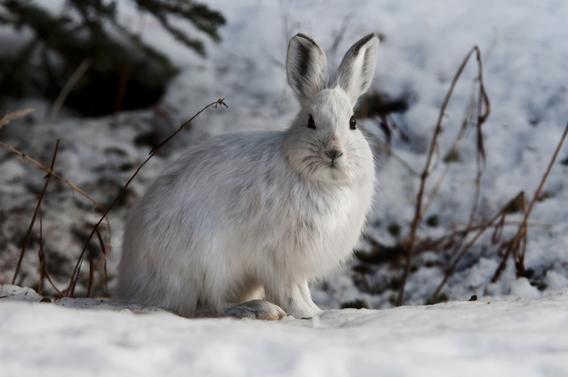
Snowshoe hares and ruffed grouse change color to match seasonal habitat conditions and avoid predation.
Challenge: Warming winters lead to decreased snow cover: this leads to the challenges of increased predation and population decline.
Principal Investigator(s):
- Benjamin Zuckerberg (University of Wisconsin Madison)
Co-Investigator(s):
- M. Zachariah Peery (University of Wisconsin Madison)
- Jonathan Pauli (University of Wisconsin Madison)
Partners:
- Wisconsin Initiative on Climate Change Impacts
- Wisconsin Department of Natural Resources
- Bad River Band of Lake Superior Chippewas
- Great Lakes Indian Fish and Wildlife Commission
Many animal species have unique characteristics that allow them to survive during winter. For example, the snowshoe hare changes its fur color from brown to white to camouflage better in winter months, and the ruffed grouse roosts under the snow to stay warm and hidden in winter. These winter-adapted species, however, are facing new challenges as climate change is resulting in shorter winters and rapid declines in snowpack. Shorter winters pose a significant threat to winter-adapted species that are used to living in, under, or on top of a protective blanket of snow.
Wildlife managers are tasked with conserving these species, yet studies understanding how specific management actions can enhance species' ability to adapt to climate change are rare. To address this need, researchers will assess how two winter-adapted species -- snowshoe hare and ruffed grouse -- respond to rapidly changing winter conditions in Wisconsin’s Sandhill State Wildlife Area. Researchers will then work with federal (USFS), state (Wisconsin Dept. of Natural Resources), and tribal (Great Lakes Indian Fish & Wildlife Commission) partners to identify viable strategies for managing winter-adapted species, such as translocation and forest management. The results of this project will help determine whether management and adaptation actions can reduce these pressures and improve the resiliency of snowshoe hare and ruffed grouse to climate change.
Read more from the CASC Project Explorer.
